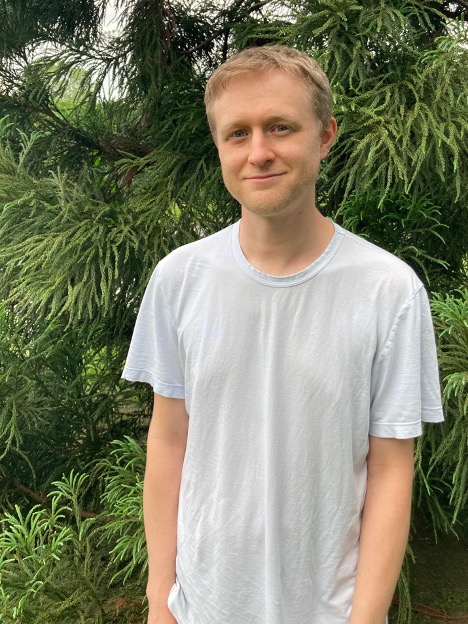Groves Lab Sunscreen Prototype Wins Pitch Competition
If it’s not safe enough to consume, it’s probably not safe enough to put on your skin and leave there for hours. With this simple statement, Micah Nelp, a postdoctoral researcher and enzymologist in the Department of Chemistry, won the Princeton Entrepreneurs’ Network 2021 Startup Pitch Competition for a biocompatible, biodegradable sunscreen called Sòliome.
Quite possibly the first over-the-counter biologics sunscreen invented, the prototype for Sòliome was developed in the Groves Lab under the guidance of Professor of Chemistry John Groves, who holds the Hugh Stott Taylor Chair of Chemistry. A colleague at the University of Utah, Anthony Young, is also participating in the startup.
Sòliome takes its inspiration from naturally existing sunscreens present in the lens of the human eye that protect the retina from UV rays. In other words, nature has already done the research.
Nelp and his startup won a $2,500 cash prize and the opportunity for meetings with venture capitalists.

Photo courtesy of Micah Nelp.
“The Food and Drug Administration did a clinical trial of 16 over-the-counter sunscreen drugs,” said Nelp during his five-minute pitch as a contest finalist. “They tested six, and all of them absorbed through the skin. If you wouldn’t eat your sunscreen, you probably shouldn’t apply it to your skin and let it sit there for hours.
“Also, coral die-offs have been tied to these thousands of tons of sunscreen that swimmers bring with them every year,” he added, noting that island destinations are banning certain types of sunscreens because of ecological damage. “Our answer is proteins: we’re going to take proteins and digest them to peptides, and then we can modify those peptides chemically so that they absorb in the UV.”
During investigations, the lab quickly honed in on a molecule that Nelp had already been studying.
“I had been studying the enzyme that made this product,” said Nelp. “I just didn’t know it was floating around in the lens of our eyes in such high concentration.” Because the molecule is already present in the human body, researchers are confident that “all aerobic” life will be able to metabolize it easily.
Sòliome surpasses other sunscreens currently on the market, said Nelp, because it will provide broad spectrum protection, will not absorb through the skin, is photostable, and is biodegradable, meaning bacteria in coral reefs can quickly consume it. In addition, the active ingredient delivered via soy protein can be acquired and scaled cheaply.
The startup has a patent disclosure filed. After partnering with investors over the next couple of years, Nelp said Sòliome will make formal application to the FDA.
“This is certainly a textbook example of how basic research coupled with some serendipity and Micah’s ingenuity have led to a practical solution to a big problem,” said Groves.
The two-day virtual entrepreneurs’ conference took place last month during Princeton University Reunions. Some 14 startup companies pitched their products or services at the event, from a group determined to put running water in every home to a design infrastructure that removes plastic from urban rivers to a digital therapeutics company that supports individuals with bi-polar disorder.
The event was sponsored by Chaac Ventures, Fitz Gate Ventures, and Nassau Street Ventures. Several principals of the investment firms served as judges and asked questions during presentations.
Nelp said Sòliome fits in well with the Groves Lab’s mission.
“Professor Groves takes inspiration from what nature does and then tries to apply it to other things,” he said. “So, this is certainly an interesting way to see that through.”
